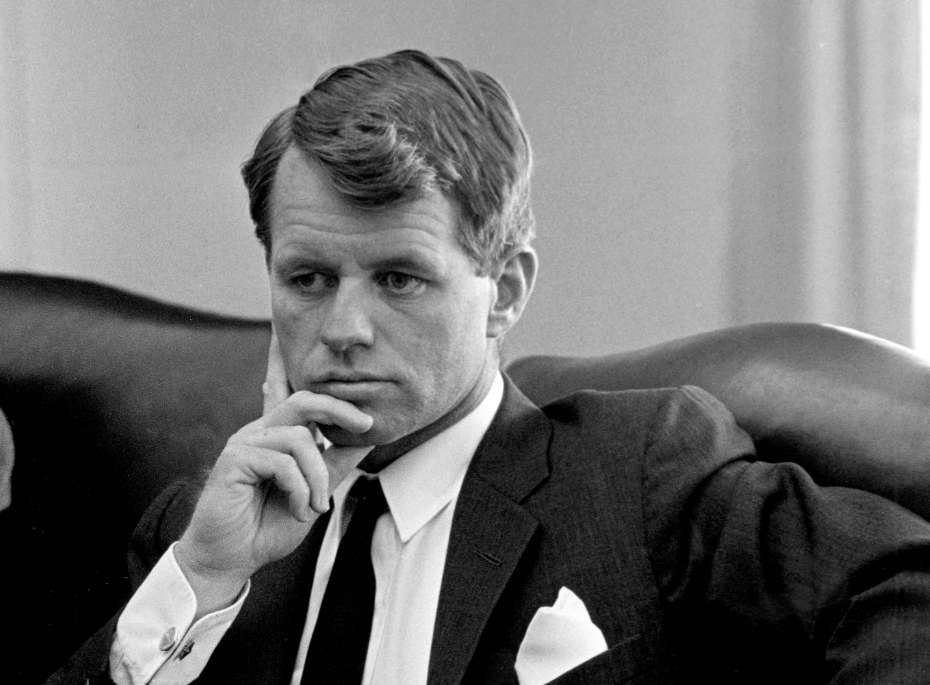Who was Robert Francis Kennedy? Information on American political leader Robert Francis Kennedy biography, life story and political career.

Robert Francis Kennedy (Source: wikipedia.org)
Robert Francis Kennedy; American political leader: b. Brookline, Mass., Nov. 20, 1925; d. Los Angeles, Calif., June 6, 1968. He was an attorney general of the United States and a U.S. Senator. Robert was the political heir of his brother, President John F. Kennedy, but at the age of 42 he suffered the same fate as his brother, death by an assassin’s bullet.
A Democrat and a pragmatic liberal strongly committed to civil rights, Robert attracted a wide and intensely loyal political following, particularly among disadvantaged minorities. Admirers were impressed with his courage and humanity, his alertness to new ideas, and his ability to inspire and command the loyalties of able men. Kennedy held strong convictions about what was right, and was often impatient in his efforts to see that what was right got done. His critics said he was ruthless and opportunistic. Kennedy, who was almost universally called “Bobby,” had a boyish face and build and an abundance of unruly hair. He and his wife, Ethel Skakel Kennedy, had 11 children, the last born posthumously.
Early Life:
Robert was the seventh of nine children. Smaller and lighter than his brothers, he had to call on ample reserves of grit and courage to excel in football and other athletic contests that his father promoted to nurture in his children an appreciation of competitive excellence. See also Kennedy (family) ; Kennedy, Joseph Patrick.
Kennedy left Harvard College in 1944 to join the Navy. After his discharge, he returned to Harvard, played end on the football team, and graduated in 1948. He earned a degree from the University of Virginia Law School in 1951, and was admitted to the Massachusetts bar.
Congressional Investigator:
In 1951-1952, as an attorney for the Criminal Division of the U.S. Department of Justice, Kennedy helped prosecute graft and income tax cases. After managing John Kennedy’s 1952 senatorial race, Robert returned to his investigatory career in 1953 as assistant counsel to the Senate permanent subcommittee on investigations chaired by Sen. Joseph McCarthy. Seven months later, Kennedy resigned, after a walkout in protest against McCarthy’s methods by Democratic senators on the subcommittee.
In 1954, Kennedy rejoined the subcommittee, first as minority counsel and then as majority chief counsel under the new chairman, Sen. John McClellan. In 1957, McClellan and Kenned-served together as chairman and chief counsel the Senate Select Committee on Improper Activities in the Labor or Management Field. Kennedy exposed the associations of David Beck, president of the International Brotherhood of Teamsters, and his successor, James Hoffa, with underworld elements. The New York Times observed that although Kennedy “is not a colorful cross-examiner … on occasion he can devastate a witness.”
Attorney General:
Kennedy left the McClellan committee in 1960 to manage John’s presidential campaign. At 35, Robert became attorney general in his brother’s cabinet. He energetically promoted civil rights, stepping up prosecution of voting rights and school desegregation cases, successfully petitioning the Interstate Commerce Commission to ban segregation in bus terminals and on interstate buses, and helping lead the fight for the Civil Rights Act of 1964. He was President Kennedy’s leading counselor on foreign affairs, national security, domestic policy, and political management.
His brother’s assassination left Robert in a prolonged state of despair, but he continued as attorney general under President Lyndon Johnson. After Johnson indicated that Kennedy would not be his choice for vice president in 1964, Kennedy took up residence in New York to run for the Senate. He was elected easily in November 1964.
Senator:
In the Senate, Kennedy favored domestic social policies more advanced than those proposed by the Johnson administration. He championed the antipoverty program, medicare, education, and other programs to improve the lot of Negroes, Puerto Ricans, American Indians, and Mexican Americans. He sharply criticized the administration’s escalation of the Vietnam War, and urged that the bombing of North Vietnam cease and that the Vietcong be given a place in South Vietnam’s government.
Presidential Campaign and Assassination:
It was widely assumed that Kennedy would some day seek the office once held by his brother. Robert was initially reluctant to challenge Johnson for renomination in 1968. However, after the success of Sen. Eugene McCarthy in the Mew Hampshire primary, Kennedy announced his candidacy on March 16, 1968. Johnson later withdrew from the race, but Kennedy still faced stiff opposition from party professionals, big businessmen, and labor leaders, most of whom favored Vice President Hubert Humphrey. Kennedy waged an emotion-charged campaign that evoked hysterical enthusiasm from his supporters. He won five of the six presidential primaries that he entered, including the primary held in California on June 4.
Shortly after midnight on June 5, Kennedy addressed his supporters at a victory celebration in the Ambassador Hotel in Los Angeles. As he left the ballroom through a kitchen passageway, he was shot three times, one bullet entering his brain. Five other persons struck by bullets were less seriously injured. Kennedy died 25 hours later in Good Samaritan Hospital in Los Angeles. An Arab immigrant, Sirhan Bishara Sirhan, seized immediately after the shooting, was subsequently indicted for first-degree murder. Sirhan was convicted in April 1969. Kennedy was buried in Arlington National Cemetery.